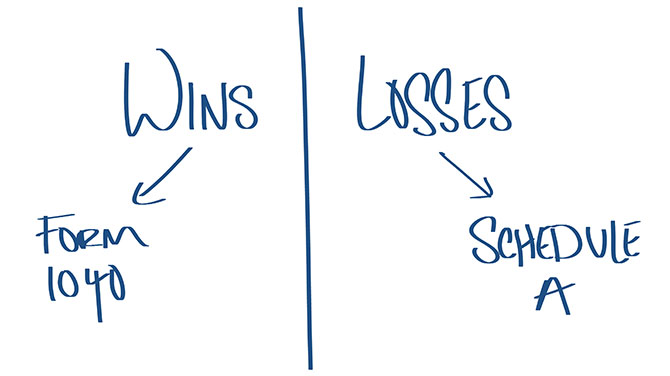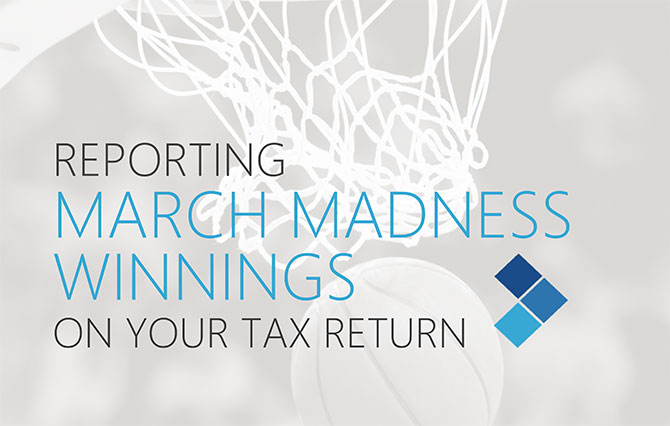Claim Gambling Winnings On Your Taxes
More Articles
If you had a successful night at the slots or poker tables, you're going to have to share some of the lucky proceeds with Uncle Sam. The Internal Revenue Service generally requires that you report your gambling winnings and losses separately when you file your taxes rather than combining the two amounts.
Record Keeping
Though you may not be able to deduct all your losses. “Taxpayers can deduct gambling losses only up to the amount of their gambling winnings,” says Leddy, “and only if they itemize their deductions.” For example, if your gambling winnings totaled $5,000 in the tax year, but you lost $6,000, you can only deduct $5,000 of those losses.
- Gambling Loss Limitation. You can't deduct more in gambling losses than you have in gambling winnings for the year. For example, suppose you reported $13,000 in gambling winnings on Line 21 of.
- Winnings are subject to your regular federal income tax rate. You might pay a lower rate on gambling winnings this year because of rate reductions under the TCJA. Amounts you win may be reported to you on IRS Form W-2G (“Certain Gambling Winnings”). In some cases, federal income tax may be withheld, too.
- Sometimes the payer (the one paying your winnings; e.g., the casino) must issue you a form with your winnings and any withholding for your taxes if your winnings reach certain levels, which vary by type of gambling. (The last instruction page of the Form W-2G lists threshold amounts of winnings requiring that the form be issued to you.).
- Your winnings might be noncash — like a vacation or a car. If so, you must include its fair market value (FMV) when figuring your income. Reporting Gambling Profits and Loss on Your Taxes. Gambling Losses Can Be Deducted on Schedule A. If you itemize your deductions, you can deduct your gambling losses for the year on Schedule A.
As you gamble during the year, you need to keep records of your winnings and losses so that you can support whatever figures you report on your taxes. The IRS permits you to use per-session recording, which means that instead of recording whether you won or lost each time you pull the slot machine, you can simply record your total for the session. Your records should include the date and type of gambling, where you gambled and if you gambled with anyone else, such as a home poker game. If you win more than $600, you should receive a Form W-2G from the casino.

Taxable Winnings


:max_bytes(150000):strip_icc():saturation(0.2):brightness(10):contrast(5)/GettyImages-dv1236010-570bead83df78c7d9ef79829.jpg)
When figuring your gambling winnings, only include the winnings from each session rather than using losses to offset your gains. You have to include gambling winnings even if you didn't receive a Form W-2G from the casino. For example, if you gambled six times during the year, winning $100, $3,000, $4,000 and $6,000 but losing $5,000 and $2,000, your gambling winnings for the year are $13,100. This amount gets reported on line 21 of your Form 1040 tax return.

Gambling Losses
Do You Claim Gambling Winnings On Your Taxes
To claim your gambling losses, you have to itemize your deductions. Gambling losses are a miscellaneous deduction, but -- unlike some other miscellaneous deductions -- you can deduct the entire loss. The deduction goes on line 28 of Schedule A and you have to note that the deduction is for gambling losses. For example, if you lost $5,000 on one occasion and $7,000 on another, your total deduction is $12,000.
Gambling Loss Limitation
Can You Claim Gambling Winnings On Your Taxes
You can't deduct more in gambling losses than you have in gambling winnings for the year. For example, suppose you reported $13,000 in gambling winnings on Line 21 of Form 1040. Even if you lost $100,000 that year, your gambling loss deduction is limited to $13,000. Worse, you aren't allowed to carry forward the excess, so if you had $87,000 in losses you couldn't deduct last year, you can't use that to offset the gambling income from the current year.
Claim Gambling Winnings On Your Taxes Returns
- tax forms image by Chad McDermott from Fotolia.com